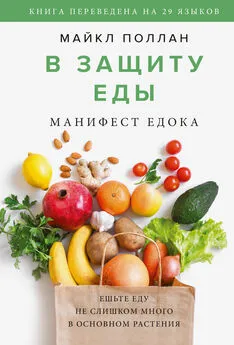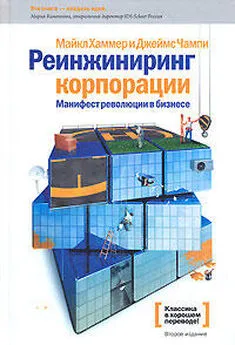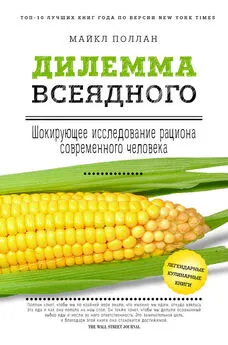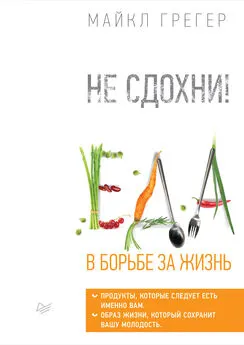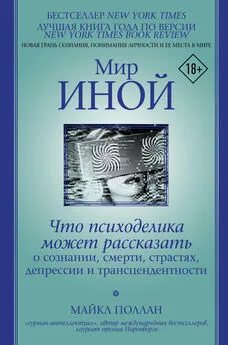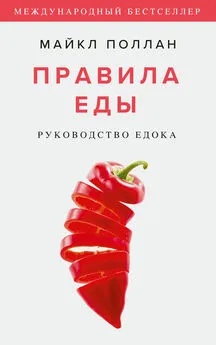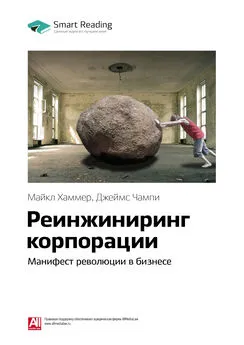Майкл Поллан - В защиту еды. Манифест едока
- Название:В защиту еды. Манифест едока
- Автор:
- Жанр:
- Издательство:Литагент МИФ без БК
- Год:2021
- Город:Москва
- ISBN:9785001696513
- Рейтинг:
- Избранное:Добавить в избранное
-
Отзывы:
-
Ваша оценка:
Майкл Поллан - В защиту еды. Манифест едока краткое содержание
Майкл Поллан призывает перестать изучать списки труднопроизносимых ингредиентов на упаковках, отказаться от модных диет и заново разобраться, что же такое правильное питание. Следуя его простым советам, вы сможете составить оптимальный именно для вас рацион, чтобы поддерживать хорошее самочувствие и быть счастливыми.
На русском языке публикуется впервые.
В защиту еды. Манифест едока - читать онлайн бесплатно ознакомительный отрывок
Интервал:
Закладка:
Список источников
Ниже приведены основные материалы, на которые я ссылаюсь в тексте книги. Это источники, из которых я почерпнул важные факты и которые помогли мне глубже понять взаимосвязь между едой и здоровьем. Ссылки на сайты актуальны на сентябрь 2007 года. Все статьи, цитаты из которых встречаются в книге, можно найти на сайте www.michaelpollan.com.
Glassner, Barry. The Gospel of Food (New York: HarperCollins Publishers, 2007).
Kantrowitz, Barbara, and Claudia Kalb. “Food News Blues.” Newsweek (March 13, 2006).
Kass, Leon. The Hungry Soul (New York: The Free Press, 1994).
Mozaffarian, Dariush, and Eric B. Rimm. “Fish Intake, Contaminants, and Human Health: Evaluating the Risks and the Benefits.” Journal of the American Medical Association. 296.15 (2006): 1885–1899.
Nesheim, Malden C., et al. “Seafood Choices: Balancing Benefits and Risks” (Washington, D.C.: National Academies Press, 2006).
Nestle, Marion. Food Politics (Berkeley: University of California Press, 2002).
Pollan, Michael. The Omnivore’s Dilemma (New York: The Penguin Press, 2006). Издана на русском языке: Поллан М. Дилемма всеядного. Шокирующее исследование рациона современного человека. М.: Эксмо, 2017.
Pollan, Michael. “Our National Eating Disorder.” The New York Times Magazine, October 17, 2004.
Prentice, Ross L. “Low-Fat Dietary Pattern and Risk of Invasive Breast Cancer: The Women’s Health Initiative Randomized Controlled Dietary Modification Trial.” Journal of the American Medical Association. 295.6 (2006): 629–642.
Roberts, Paul. “The New Food Anxiety.” Psychology Today (March/April, 1998).
Rozin, Paul. “The Selection of Foods by Rats, Humans, and Other Animals” в издании Advances in the Study of Behavior, Vol. 6. // J. Rosenblatt, R. A. Hilde, C. Beer, and E. Shaw ed. (New York: Academic Press, 1976), pp. 21–76. Фразу «дилемма всеядного» обычно приписывают Полу Роузину, специалисту, изучающему психологические факторы, влияющие на гастрономические предпочтения человека.
Scrinis, Gyorgy. “Sorry Marge.” Meanjin. 61.4 (2002): 108–116. В этой замечательной статье Скринис предложил ввести понятие «нутриционизм».
Temple, Norman J., and Denis P. Burkitt. Western Diseases (New Jersey: Humana Press Inc., 1994).
Trivedi, Bijal. “The Good, the Fad, and the Unhealthy.” New Scientist (September 23, 2006).
О том, как развивалась наука о питании и как с годами менялись официальные рекомендации диетологов:
Brock, William H. Justus von Liebig: The Chemical Gatekeeper (Cambridge: Cambridge University Press, 1997).
Cambridge World History of Food, The: Volume One // Kenneth F. Kiple and Kriemhild Conee Ornelas ed. (Cambridge: Cambridge University Press, 2000).
Cambridge World History of Food, The: Volume Two // Kenneth F. Kiple and Kriemhild Conee Ornelas ed. (Cambridge: Cambridge University Press, 2000).
Cannon, Geoffrey. The Fate of Nations: Food and Nutrition Policy in the New World. The Caroline Walker Lecture 2003 (London: Caroline Walker Trust, 2003). Ознакомиться можно здесь: www.cwt.org.uk.
Cannon, Geoffrey. “Nutrition: The New World Map.” Asia Pacific Journal of Clinical Nutrition. 11 (2002): S480–S497.
“Effect of Vitamin E and Beta Carotene on the Incidence of Lung Cancer and Other Cancers in Male Smokers, The. The Alpha-Tocopherol, Beta Carotene Cancer Prevention Study Group.” The New England Journal of Medicine. 330.15 (1994): 1029–1035.
Freudenheim, Jo L. “Study Design and Hypothesis Testing: Issues in the Evaluation of Evidence from Research in Nutritional Epidemiology.” American Journal of Clinical Nutrition. 69 (1999): 1315S–1321S.
Glassner, Barry. The Gospel of Food (New York: HarperCollins Publishers, 2007).
Kantrowitz, Barbara, and Claudia Kalb. “Food News Blues.” Newsweek (March 13, 2006).
Levenstein, Harvey. Paradox of Plenty (Berkeley: University of California Press, 2003).
Levenstein, Harvey. Revolution at the Table: The Transformation of the American Diet (Berkeley: University of California Press, 2003). Включает весьма любопытный отчет о существенных изменениях во вкусовом восприятии у американцев.
Melton, Lisa. “The Antioxidant Myth.” New Scientist (August 5–11, 2006).
Planck, Nina. Real Food: What to Eat and Why (New York: Bloomsbury, 2006).
Scrinis, Gyorgy. “Sorry Marge.” Meanjin. 61.4 (2002): 108–116.
Shapiro, Laura. Perfection Salad: Women and Cooking at the Turn of the Century (New York: Random House, 2001).
Taubes, Gary. Good Calories, Bad Calories (New York: Knopf, 2007).
Taubes, Gary. “The Soft Science of Dietary Fat.” Science. 291.30 (March 2001).
Taubes, Gary. “What if It’s All Been a Big Fat Lie?” The New York Times (July 7, 2002).
Trivedi, Bijal. “The Good, the Fad, and the Unhealthy.” New Scientist (September 23, 2006).
U.S. Department of Health and Human Services. The Surgeon General’s Report on Nutrition and Health (Washington, D.C., 1988).
U.S. Senate Select Committee on Nutrition and Human Needs. Dietary Goals for the United States (Washington, D.C., 1977).
О современном ассортименте продуктов питания и методах их продажи:
Hartman, Harvey, and Jarrett Paschel. “Understanding Obesity: Practical Suggestions for the Obesity Crisis” (Bellevue: The Hartman Group, Inc., 2006). Интересный антропологический анализ того, как пищевые привычки американцев приводят к ожирению.
Lofstock, John. “Boosting Impulse Sales at the Checkout Counter.” Convenience Store Decisions (January 11, 2006).
Martin, Andrew. “Makers of Sodas Try a New Pitch: They’re Healthy.” The New York Times (March 7, 2007).
Merill, Richard A., et al. “Like Mother Used to Make: An Analysis of FDA Standards of Identity.” Columbia Law Review. 74.4 (May 1974). Включает полезную информацию о том, как в 1973 году FDA решило отменить действие правила, касающегося заменителей натуральных продуктов.
Nestle, Marion. Food Politics (Berkeley: University of California Press, 2002).
Nestle, Marion. What to Eat (New York: North Point Press, 2006).
Simon, Michele. Appetite for Profit (New York: Nation Books, 2006).
Что касается сложных и противоречивых данных в современной науке о питании и ее главных принципах, на эту тему можно найти массу источников. Начать рекомендую с прекрасного эпилога в книге Food Politics («Пищевая политика»). Также обратите внимание на книгу Гэри Таубса Good Calories, Bad Calories («Хорошие калории, плохие калории»), в которой автор вдумчиво критикует и эпидемиологические, и клинические исследования, касающиеся сферы питания. Еще больше информации о методологии, используемой в науке о питании, можно найти в следующих источниках:
Belanger, C.F., C.H. Hennekens, B. Rosner et al. “The Nurses’ Health Study.” American Journal of Nursing. (1978): 1039–1040.
Campbell, T. Colin. “Letters to the Editor: Animal Protein and Ischemic Heart Disease.” American Journal of Clinical Nutrition. 71.3 (2000): 849–850.
Freudenheim, Jo L. “Study Design and Hypothesis Testing: Issues in the Evaluation of Evidence from Research in Nutritional Epidemiology.” American Journal of Clinical Nutrition. 69 suppl (1999): 1315S–1321S.
Giovannucci, Edward, et al. “A Comparison of Prospective and Retrospective Assessments of Diet in the Study of Breast Cancer.” American Journal of Epidemiology. 137.5 (1993): 502–511.
Horner, Neilann K. “Participant Characteristics Associated with Errors in Self-Reported Energy Intake from the Women’s Health Initiative Food-Frequency Questionnaire.” American Journal of Clinical Nutrition. 76 (2002): 766–773.
Hu, Frank B., and Walter Willett. “Letters to the Editor: Reply to TC Campbell.” American Journal of Clinical Nutrition. 71.3 (2000): 850–851.
Hu, Frank B., et al. “Reproducibility and Validity of Dietary Patterns Assessed with a Food-Frequency Questionnaire.” American Journal of Clinical Nutrition. 69 (1999): 243–249.
Kristal, Alan R., et al. “Is It Time to Abandon the Food Frequency Questionnaire?” Cancer Epidemiology Biomarkers Prevention. 14.12 (2005): 2826–2828.
Liu, Simin, et al. “Fruit and Vegetable Intake and Risk of Cardiovascular Disease: The Women’s Health Study.” American Journal of Clinical Nutrition. 72 (2000): 922–928.
Napoli, Maryann. “Prevention Advice to Women Doesn’t Hold Up.” Center for Medical Consumers Web site (March 2006). Available online at www.medicalconsumers.org.
Ostrzenski, Adam, and Katarzyna M. Ostrzenska. “WHI Clinical Trial Revisit: Imprecise Scientific Methodology Disqualifies the Study’s Outcomes.” American Journal of Obstetrics and Gynecology. 193 (2005): 1599–1604.
Rosner, B., W. C. Willett, et al. “Correction of Logistic Regression Relative Risk Estimates and Confidence Intervals for Systematic Within-Person Measurement Error.” Statistics in Medicine. 8 (1989): 1051–1069.
Stein, Karen. “After the Media Feeding Frenzy: Whither the Women’s Health Initiative Dietary Modification Trial?” Journal of the American Dietetic Association. (2006): 794–800.
Taubes, Gary. “Epidemiology Faces Its Limits.” Science. 269.5221 (1995): 164–169.
Taubes, Gary. Good Calories, Bad Calories (New York: Knopf, 2007).
Twombly, Renee. “Negative Women’s Health Initiative Findings Stir Consternation, Debate Among Researchers.” Journal of the National Cancer Institute. 98.8 (April 19, 2006).
Willett, Walter C. “Invited Commentary: A Further Look at Dietary Questionnaire Validation.” American Journal of Epidemiology. 154.12 (2001): 1100–1102.
Willett, Walter C., and Frank B. Hu. “Not the Time to Abandon the Food Frequency Questionnaire: Point.” Cancer Epidemiology Biomarkers Prevention. 15.10 (2006): 1757–1758.
О влиянии пищевого жира на здоровье:
Beresford, Shirley A. “Low-Fat Dietary Pattern and Risk of Colorectal Cancer: The Women’s Health Initiative Randomized Controlled Dietary Modification Trial.” Journal of the American Medical Association. 295.6 (2006): 643–654.
Читать дальшеИнтервал:
Закладка:
